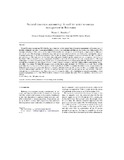| dc.contributor.author | Hambira, W.L. | |
| dc.date.accessioned | 2009-02-13T12:36:50Z | |
| dc.date.available | 2009-02-13T12:36:50Z | |
| dc.date.issued | 2007 | |
| dc.identifier.citation | Hambira, W.L. 2007 Natural resources accounting: A tool for water resources management in Botswana, Physics and Chemistry of the Earth, vol. 32, pp. 1310–1314 | en |
| dc.identifier.issn | 1474 7065 | |
| dc.identifier.uri | http://hdl.handle.net/10311/283 | |
| dc.description.abstract | Natural Resource Accounting (NRA) has become an important environmental/natural resources management tool in recent years. It
provides information on stocks of a resource available at a particular point in time and what activities the resource is being used for. The
conventional System of National Income Accounts (SNA) normally does not capture the cost of depletion, degradation or pollution of
natural resources. This encourages unsustainable use of natural resources since the costs are not reflected when assessing the country’s
economic performance or development progress. NRA is thus an attempt to integrate environmental issues into the conventional
national accounts. The water sector is one sector that could greatly benefit from this natural resource management tool. Botswana
has adopted NRA as a natural resource management tool and has so far developed accounts for minerals, livestock and water. The focus
of this paper is on Water Accounting (WA) in relation to Integrated Water Resources Management (IWRM). IWRM is concerned with
coordinated development and management of water in order to maximise economic and social welfare without compromising the sustainability
of ecosystems. WA helps fill data gaps since it provides the required information for IWRM to be achieved. The aim of this
paper therefore is to evaluate the Water Accounts of Botswana Report of 2006 to determine the extent to which it can contribute to
integrated water resources management. The paper is based on literature review and the results show that: the available water stocks
vary depending on rainfall patterns, well fields are over utilised, there has been growth in consumption, and more than 80% of the waste
water produced is not being put to use. These results calls for changes in policies, role of institutions and practices pertaining to water
resources management which is what IWRM is all about hence the paper concludes that indeed WA can contribute to the realisation of
IWRM. | en |
| dc.language.iso | en | en |
| dc.publisher | Elsevier, http://www.elsevier.com/wps/find/journaldescription.cws_home/413/description#description | en |
| dc.subject | Botswana | en |
| dc.subject | IWRM | en |
| dc.subject | Natural resources accounting | en |
| dc.subject | Water accounting | en |
| dc.title | Natural resources accounting: A tool for water resources management in Botswana | en |
| dc.type | Published Article | en |

